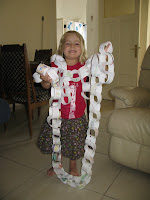
Although the long prayers of Rosh Hashana can grate, I do find that I enjoy the unfettered time sitting in one place (more or less, and children permitting), for usually three or four hours, surrounded by the sounds of the holiday. Usually these include: the hazan, the guys talking, kids running in and out of shul, those same kids being shushed by the guys talking, etc.
But mostly I find that it gives me a good opportunity to think about the themes of the day. And perhaps my favorite thing to think about almost every Rosh Hashanah and Yom Kippur, is a prayer that forms the heart of the piyyutim (liturgic prayers) in the opening of the hazarat ha-shats (the cantor's repitition of the Amida), an elegant piece written in medieval Germany, "Unetaneh Tokef," ("And let us now recount...").
The main part of the poem deals with the theme of judgment -- it is a dramatic narration of the way that the judgment of souls happens on Yom Kippur. First there is the sound of a shofar, which is described surprisingly as "d'mama daka," "still and thin," and then the souls are shepherded (literally, they are compared to sheep) to be judged.
Ok, all well and good, but the part of the poem that always gets me is towards the end. Here is what it says, in translation:
"Man's origin is dirt and his end is to dirt
with his very life he brings home his bread
he is but a broken shard, dried-out grass
a fallen flower, a passing shadow
a dissolving cloud, a passing breeze
a puff of dust, a fleeting dream."
Every year, and this one is no exception, this affects me very deeply. It says it all, I think; it is, in its simple list of really admittedly trite metaphors, speaking the most profound truth: that this is all there is. Or, to put it in succinct Hebrew, "מה זה יש." This life is what we are given, and we must account with our very souls for its meaning, because, in all the millenia of those who have come and gone, the end of us all is the same.
This year, I brought to this prayer something new. Lately I've developed something of an interest in the history of Mahayna (especially Zen) Buddhism, and in my reading I discovered a very fascinating resonance to this passage, both in the literal content and in the meaning of the passage in the awakening of a central figure in the history of Zen, no less than the Sixth Patriarch who is credited, in some traditions, with the establishment of the fundamental form of Zen meditation, that is Zazen, or sitting meditation, the monk Daijan Hui Neng.
Hui Neng came from modest origins. In fact, he had no formal training as a monk at all. He was illiterate, an orphan, and a laborer. One night, he heard a group of monks chanting a central piece of Zen writing, the Diamond Cutter's Sutra (so named, I've been told, because it cuts through the hardest of illusions to reveal the truth -- and I think that's an apt description). Listening to the monks chant the sutra, they came to the final passage. When Hui Neng heard it, he was struck, and achieved a moment of clarity, a glimpse of what is described in the Zen tradition as "satori," or, as we tritely translate it, "enlightenment." He then went on to become the key link in the chain of transmission of the dharma. Here are the words he heard:
"Thus shall ye think of all this fleeting world:
A star at dawn, a bubble in a stream;
A flash of lightning in a summer cloud,
A flickering lamp, a phantom, and a dream."
Even as I write this, the recognition of how similar the two texts are, despite being written thousands of miles and hundreds of years apart, makes me shiver. The traditions are so different and yet come to the same conclusion in this instance, even the same words.
What does it all mean? I don't know, and to be honest, I'm not even really interested in figuring it out. I'm simply pleased to experience the sentiment, to distill the truth of both expressions, because what they both reflect is the very basic sentiment:
Life is short. It is also precious. Don't forget.
Shana tova.




